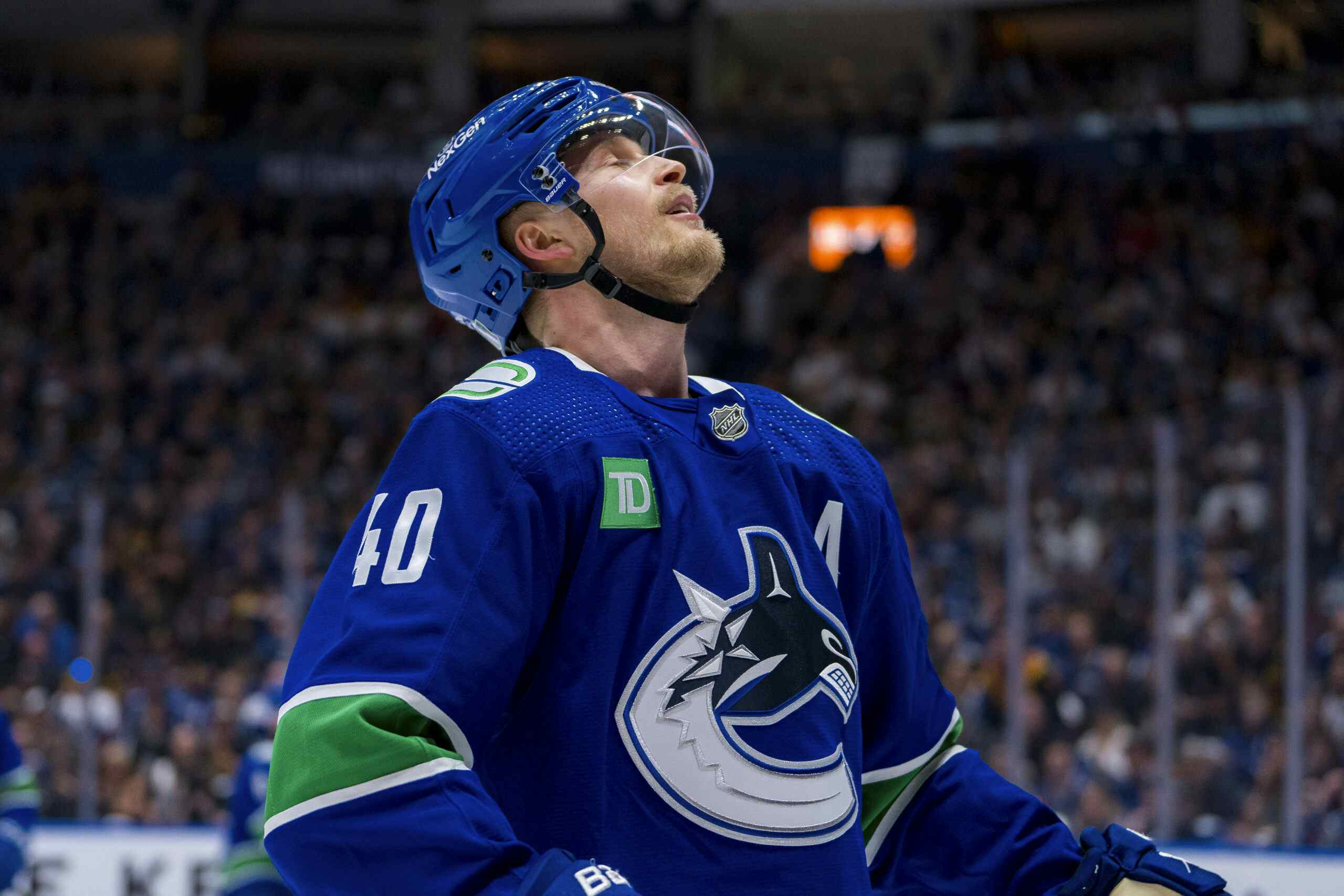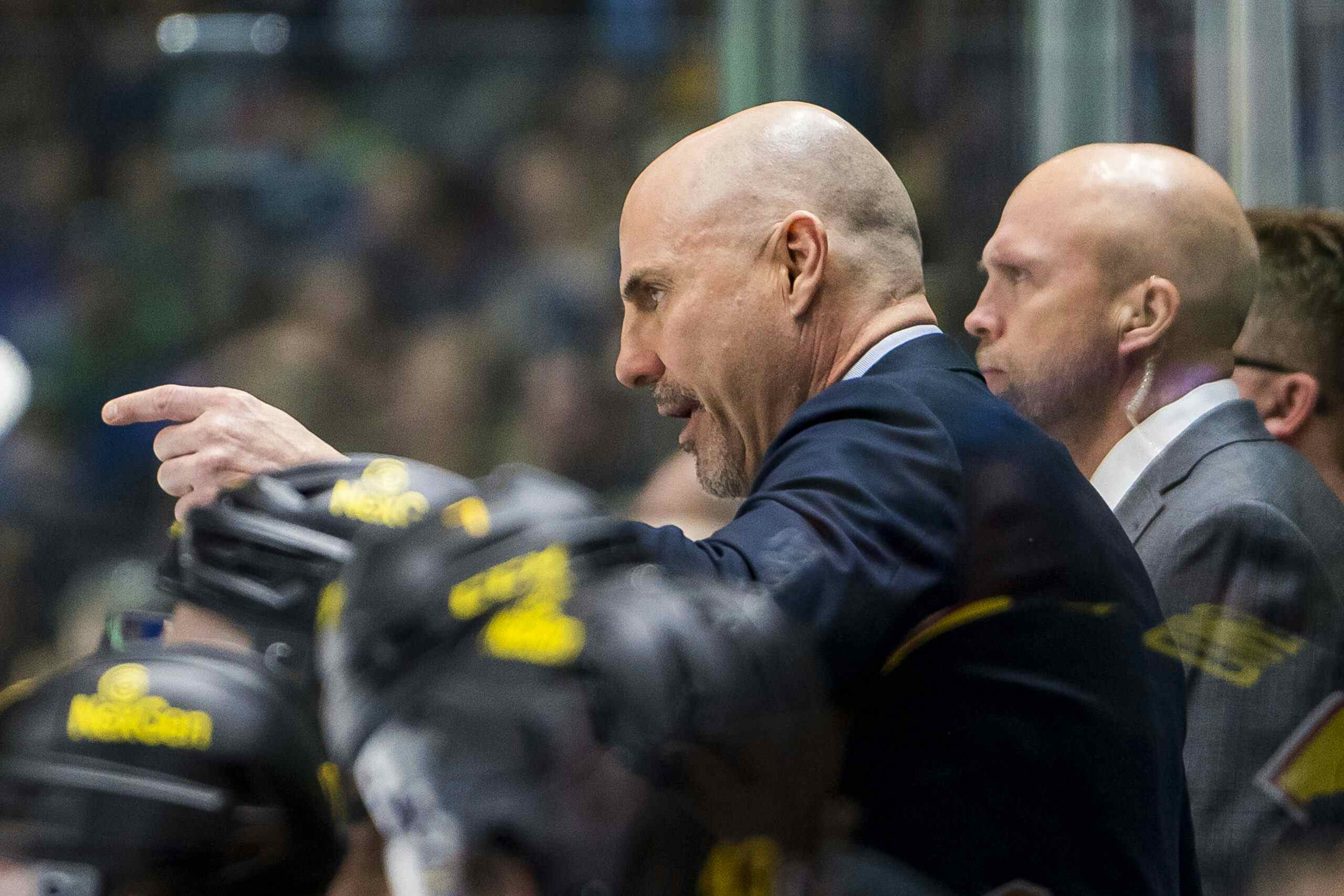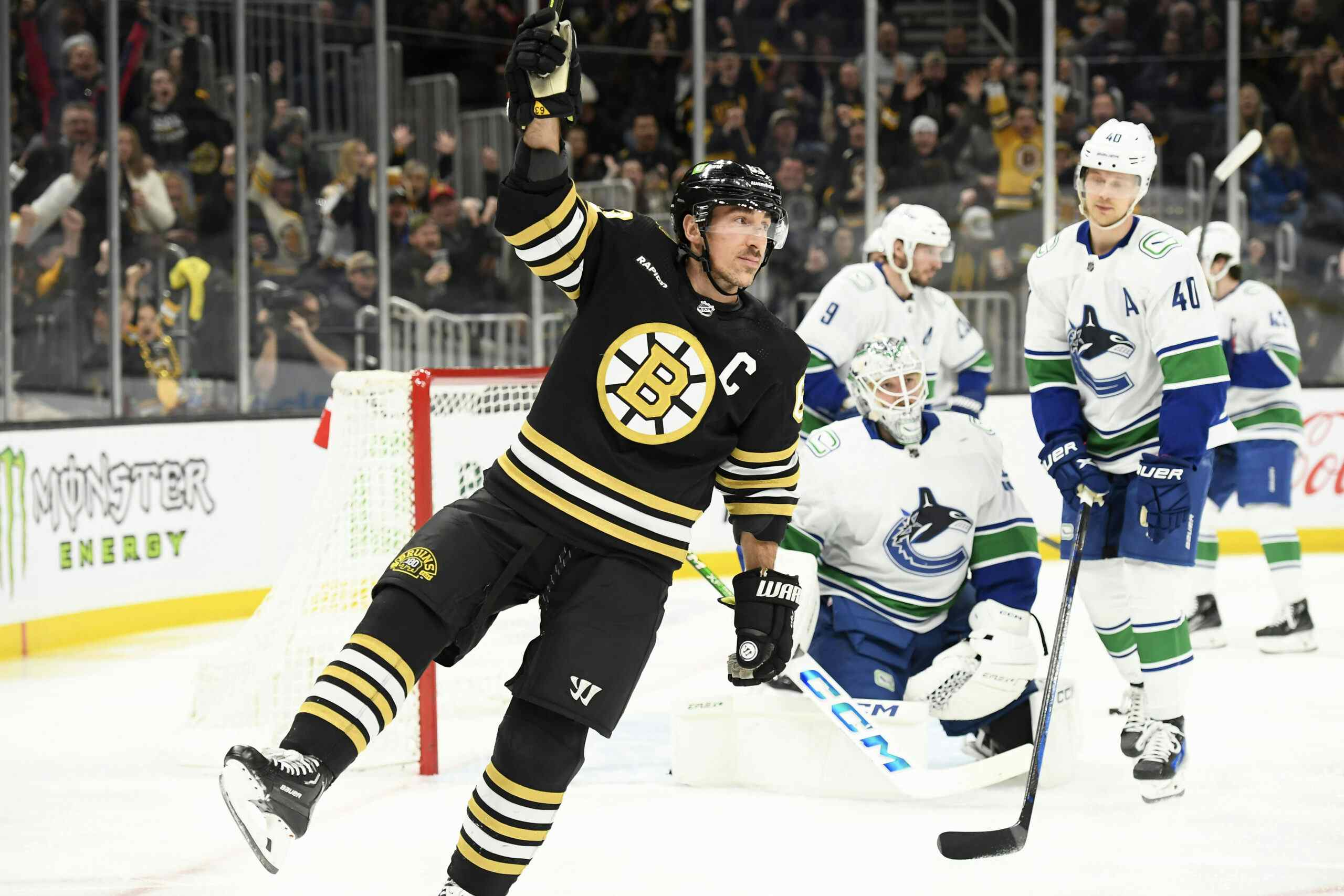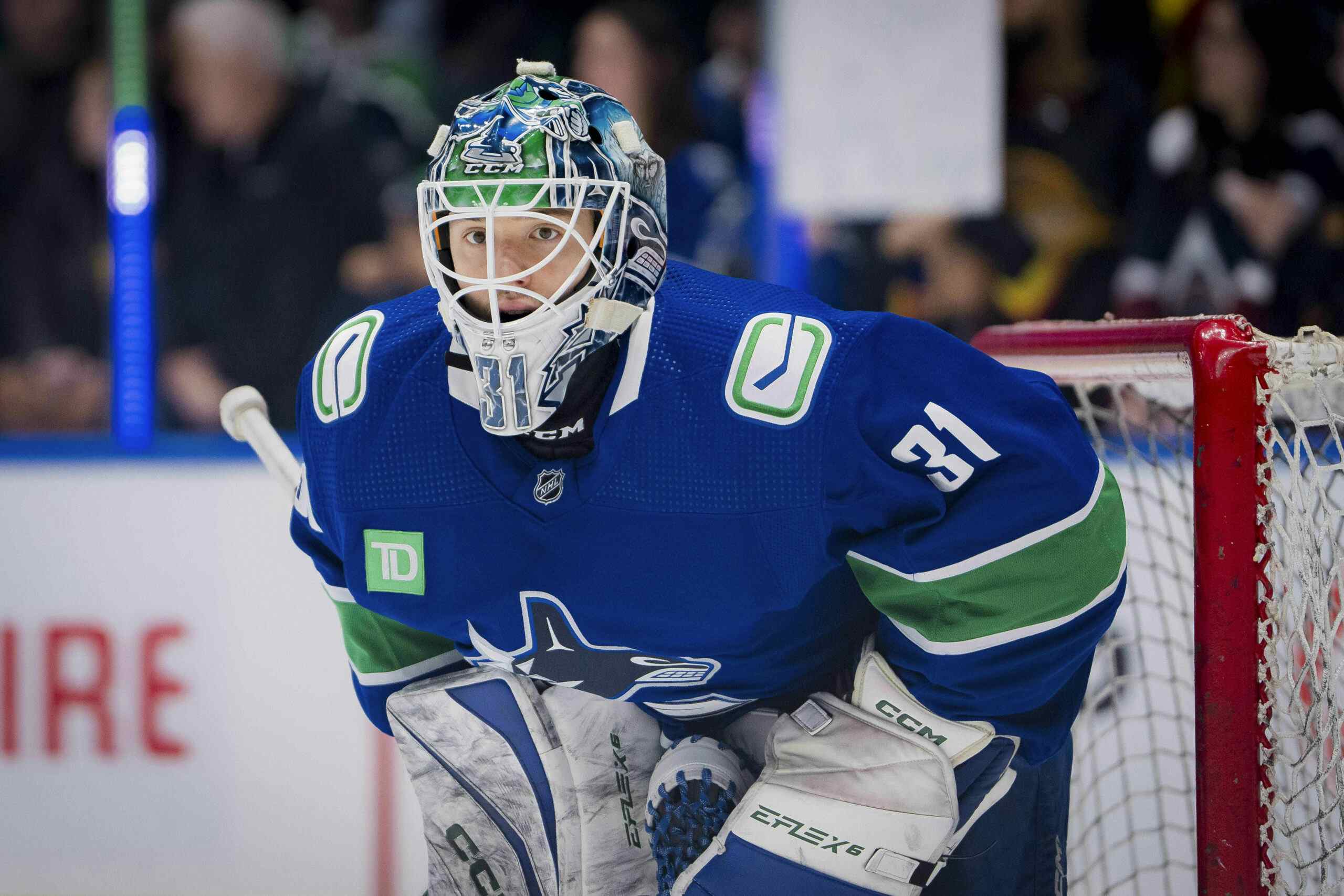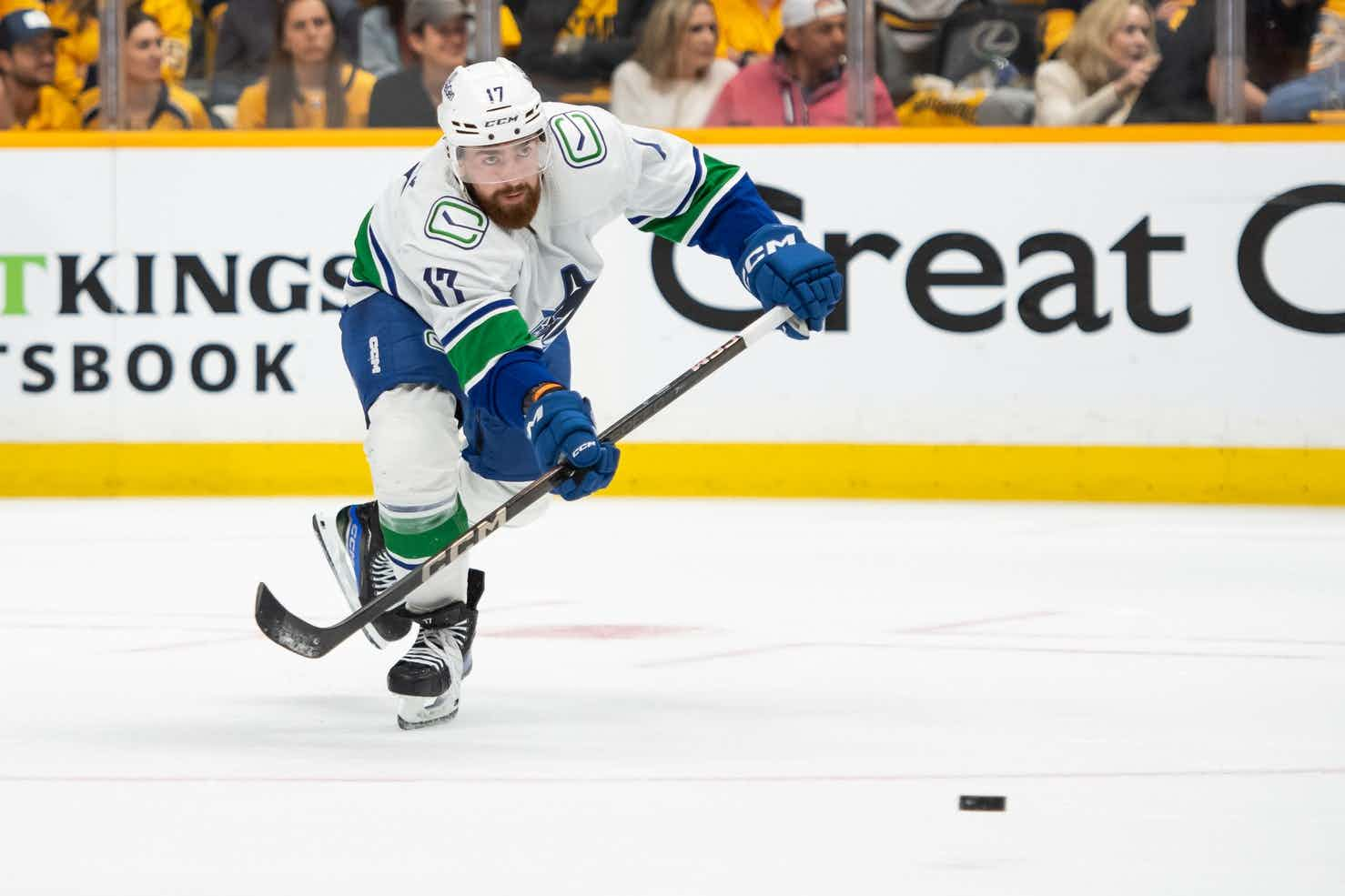In Praise of Staying the Course and the Vancouver and San Jose models
By Cam Charron
11 years ago
Joe Thornton and Roberto Luongo discuss how playoff success is over-rated.
If there’s an NHL organization I can look at that has shared the same level of successes and failures over the past decade as the Vancouver Canucks, it’s the San Jose Sharks (although the Sharks are a group that has somehow withstood more moments of wretched heartbreak and appear to be on a faster track out of contention.)
The randomness of a playoff series or a playoff tournament changes so many perceptions about how teams are built. This isn’t just about how the Canucks failed to ride the percentages in a seven-game series with the eventual 2011 Stanley Cup Champions. This is about how, over years, singular seasons of a franchise become a bright beacon illuminating the success and process of a management group.
Read on past the jump.
By the time 2007 rolled around, the Detroit Red Wings had lost Brendan Shanahan, Steve Yzerman and Sergei Fedorov, the key members and core components of the Detroit Red Wings teams that had netted three Stanley Cups in six years. By that time, the keys to the franchise had been handed to Nicklas Lidstrom, Pavel Datsyuk and Henrik Zetterberg.
In the early years of that core, the Red Wings managed little success in the postseason despite dominance over the Central Division. In 2003, they were swept in four straight by the Mighty Ducks of Anaheim as a No. 1 seed. In 2004, they lost in six games to the Calgary Flames. In 2006, as Presidents’ Trophy winners, they fell in six games to the Edmonton Oilers and in 2007 were feasted on by the juggernaut Anaheim Ducks of 2007.
Google doesn’t turn up very many results from prominent columnists around the time of the 2007 playoffs, but I do recall the prominent narrative being that the Red Wings and their new core simply didn’t have what it took to win. No team could be led to the Cup by Europeans. You needed Canadian toughness exhibited by Anaheim, the goaltending exhibited by Carolina or the determination of a veteran such as Dave Andreychuk exhibited by Tampa Bay. I remember this being the narrative because I distinctly believed it—when former Kamloops Blazer Scott Niedermayer lifted the Stanley Cup above his head on June 6, 2007, he became the 80th North American captain in 80 seasons to do so.
Something else happened in the sports world that season and it was only after the Ducks eliminated the Red Wings that I saw the connection. That previous February, Tony Dungy of the Indianapolis Colts defeated Lovie Smith of the Chicago Bears in the Superbowl. That was monumental because Dungy became the first African American coach to win a Superbowl title. To that point, though, it occurred to me that I’d never heard the narrative “a black coach can’t win a Superbowl” to the same extent that “a European captain can never win a Stanley Cup”. In fact, why did one of the statements sound so absurdly racist, but the second was a prominent talking point?
The 2008 Detroit Red Wings did win the Stanley Cup, and Lidstrom became the first ever European captain to win one, and they did it as one of the most dominant teams we’ve seen. We only have five seasons of reliable puck-possession data (well, six if you count the 2002 season, where statistical emeritus Vic Ferrari actually tracked zone time, and it was there he made the connection to the shot clock) and the Detroit Red Wings of 2008 are the best team at that.
Years later, the ’08 Red Wings are the only team of the Lidstrom-Datsyuk-Zetterberg era to win a Stanley Cup, but the Detroit model is still praised.
Cool. So what does that have to do with the Sharks and the Canucks? The key is that the Sharks and Canucks are the poster children for teams that can’t seem to take that next step, that they’re missing some required element. The Sharks have made the playoffs eight consecutive seasons, losing three times in the Western Conference Finals, three times in the semis and twice in the quarters, including the season they won the Presidents’ Trophy. Joe Thornton, the league MVP in 2006, and Patrick Marleau, the franchise leader in games played, goals and points, frequently get criticized for their accumulated disappearing acts in the post-season.
It’s a familiar refrain to what we’ve heard in Vancouver through three years of playoff failures during the Marc Crawford era and through four years of the Mike Gillis era. I heard lots of things on the Team 1040 that I didn’t necessarily agree with about Markus Naslund between 2002-2004 (the “we choked” speech ranks up there with “we’ll take the ball and we’re going to score” as one of the most annoying sports clips) and I heard lots of things on Team 1040 that I didn’t necessarily agree with about the Sedin twins between 2002-2009.
What’s the defining element that the Sharks and Canucks lack? They’re just the teams that failed to luck out, who have had good squads and never won because only one out of 30 teams can win it each season. When Naslund was the Captain, you could blame it on the European captain. Since the hockey world is more enlightened than it was back in 2004, that’s no longer the case.
One of the biggest issues with analytics is that its most hardcore followers tend to discount things like “heart” or “clutch performance” because they are not quantifiable. That’s a bad idea in hockey, which is so highly dependent on one-on-one battles. Meanwhile, Oakland A’s general manager Billy Beane, the hero of Moneyball, blamed his team’s playoff failures on “luck.” That’s a cop-out.
I like Elliotte a lot, and he’s been one of the key guys in the mainstream media who has directed casual fans to the work of Gabriel Desjardins & Co. through his 30 Thoughts weekly column at CBC. That said, I think that suggesting that losing teams lacked a special substance to put them over the finish line is also a cop-out. The facts in relation to the media narrative surrounding the A’s are laid out hilariously in the penultimate chapter of Moneyball:
The moment the play-offs began, you could feel the world of baseball insiders rising up to swat down the possibility that the Oakland A’s front office actually might be onto something. The man who spoke for all insiders was Joe Morgan, the Hall of Fame second baseman, who was in the broadcast booth for the entire five-game series between the A’s and the Twins. At some point during each game Morgan explained to the audience the flaw in the A’s thinking—not that he had any deep understanding of what that thinking entailed. But he was absolutely certain that their strategy made no sense. When the A’s lost the first game, 7-5, it gave Morgan his opening to explain, the the first inning of the second game, why the Oakland A’s were in trouble. “You have to manufacture runs in the postseason,” he said, meaning bunt and steal and in general treat outs as something other than a scarce resource. Incredibly, he then went on to explain that “manufacturing runs” was how the New York Yankees had beaten the Anaheim Angels the night before.I had seen that game. Down 5-4 in the eighth inning, Yankees second baseman Alfonso Soriano had gotten himself on base and stolen second. Derek Jeter then walked, and Jason Giambi singled in Soriano. Bernie Williams then hit a three-run homer. A reasonable person, examining that sequence of events, says, “Whew, thank God Soriano didn’t get caught stealing; it was, in retrospect, a stupid risk that could have killed the whole rally.” Joe Morgan looked at it and announced that Soriano stealing second, the only bit of “manufacturing” in the production line, was the cause. Amazingly, Morgan concluded that day’s lesson about baseball strategy by saying, “You sit and wait for the three-run homer, you’re still going to be sitting there.”
Paul DePodesta, one of the protagonists of the book, sits down with Michael Lewis at the conclusion of the postseason and points out that the A’s actually scored just as many runs during the playoffs as they did in the regular season: what changed was the pitching. Generally, the narrative never matches the facts.
Much of this comes off of memory, but the way I see it, there have been eight real good regular season teams in the last eight years: Pittsburgh, Chicago, Vancouver, San Jose, Philadelphia, Washington and Boston. In praise of the Sharks and the Canucks, neither team has done too much to affect their core despite having not won titles. Philadelphia and Washington both panicked and abandoned what they had built. Jeff Carter and Mike Richards, franchise cornerstones, were traded away. The Capitals, who drew rave reviews for their 2011 offseason and subsequent 7-0-0 start, hit a PDO skid, fired their coach, and have yet to recover. (A lot more went on with the Capitals. Check out this excellent piece from Japers Rink about the team’s reaction to running into a red-hot Jaroslav Halak in the 2010 playoffs)
Abandoning the elements that made the team great in the past because the focus is on results is no way to guarantee future results. The Canucks haven’t exactly had a choice in their struggles. Former positions of strength, the powerplay and goaltending, have been cold to start the season. Over the recent 2-6 slide, Canuck goaltenders have stopped just .896 of shots at even strength. Meanwhile the powerplay’s inability to generate shots is a huge source of concern.
Despite the recent struggles of the two clubs (they’re both on skids that have left them at 8th and 7th spots in the conference), San Jose and Vancouver wake up this morning with Fenwick Close percentages of 51.2% and 53.7%. The Canucks are ranked 6th in the league in one of the most predictive statistic the sport has to offer, a statistic more predictive than win-loss records or goal differentials when you’re looking at a longer stretch of games. The process is mocked, but it’s there. There’s this lifeless heap of a team that for the last two games has controlled play, put up scoring chances, even as they’ve lost by a combined score of 8-3.
Contrary to popular belief this particular version of the Canucks is a good hockey team that has generated opportunities to score and controlled gamers better than their opponents have over the last while. That also sounds like a cop out, or forgiving the team for not adding another scorer, but it really isn’t. This is the same way I grade every team, the same way I forgave Los Angeles for making bold offseason moves last summer that didn’t pan out until they added Jeff Carter, the same way I forgave Montreal in the first half of last season, and the same way I didn’t jump on the bandwagons of the Minnesota Wild or Toronto Maple Leafs when they were in playoff positions.
Over the long run, sticking with “the Vancouver model” of waiting will lead to better results than the Philadelphia and Montreal models of changing everything when the going gets tough, and leaving your NHL core absolutely barren for the next team. (Incidentally, new Habs GM Marc Bergevin has done a fantastic job cleaning up Pierre Gauthier’s mess. He was able to trade away Erik Cole, meaning he can use his second amnesty buy-out on Tomas Kaberle. If you click that link above, you’ll find last year’s Habs are quite similar to this season’s Canucks: a good even strength team that couldn’t score a powerplay goal. When they fired Jacques Martin, they went right into the toilet)
The Canucks and the Sharks – two teams that get mocked for having success in the regular season – are seemingly in danger of missing the playoffs at the moment. This is a regular season for the Canucks where nothing seems to have gone right. They’ve been hit with three injuries, the weakest goaltending the team has seen since the Alex Auld era, all despite out-shooting and out-chancing the opposition in close-score situations. For the Sharks, their problems date back to last season, when despite being the 7th best possession team in the NHL, nothing was going in. They scraped their way into the playoffs, died on the rock, started out hot this season and went cold. They’ll still be judged for playoff success and I wouldn’t count them out either. Behind Chicago and Los Angeles, the Canucks and the Sharks are both in a second tier of four teams along with the Red Wings and Blues who, based on puck-possession numbers, are in good positions for playoff upsets.
The way to end this, could be hilariously to link to the piece where George McPhee suggests that Dale Hunter, who replaced Boudreau and took them no further in the playoffs, “taught this club the ‘how’ to win … the ‘how’ is being a team and sacrificing and he sure got that out of this club”.
In retrospect, the quote looks silly. You can’t teach winning, and you can’t make decisions for emotional reasons and expect them to pay off more than they don’t. If the Canucks fired their coach and got rid of three of their big contracts on defence in Alex Edler, Jason Garrison and Kevin Bieksa who have faced their share of heat this season and that doesn’t work out, then you’re in a worse off position than when you started.
Again, the narrative rarely ever matches reality. Lessons learned from the 2008 Red Wings, who stuck with an “aging” “soft” “european” core that had a lot of regular season success, and never won a thing.
Recent articles from Cam Charron

